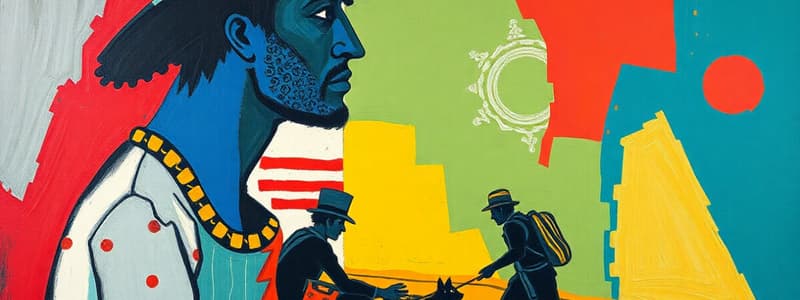Podcast
Questions and Answers
What was a major reason for colonists' protests against King George III?
What was a major reason for colonists' protests against King George III?
- The king taxed the colonies to pay debts from a war. (correct)
- The king allowed religious freedom.
- The king supported the building of plantations.
Which of the following statements accurately describes the people who were brought from Afric to the colonies?
Which of the following statements accurately describes the people who were brought from Afric to the colonies?
- They were free to work on plantations as got paid for their labor.
- They were for free speech.
- They settled in the colonies as on their own seeking better lives.
- They were enslaved and forced to work without rights and without pay. (correct)
Which woman is noted for speaking about her faith in a time when men were expected to lead such discussions?
Which woman is noted for speaking about her faith in a time when men were expected to lead such discussions?
- Abigail Adams
- Benjamin Franklin
- Anne Hutchinson (correct)
- Phillis Wheatley
What does the term 'colony' refer to?
What does the term 'colony' refer to?
What rights come with 'free speech'?
What rights come with 'free speech'?
Why did people want to move to the thirteen colonies?
Why did people want to move to the thirteen colonies?
What was a common beverage enjoyed by the colonists?
What was a common beverage enjoyed by the colonists?
What significant action did Parliament take that angered the colonists?
What significant action did Parliament take that angered the colonists?
Who was Phillis Wheatley?
Who was Phillis Wheatley?
What type of government is characterized by a king or queen in power?
What type of government is characterized by a king or queen in power?
What were plantations known for in the colonies?
What were plantations known for in the colonies?
What does the term 'enslaved' mean?
What does the term 'enslaved' mean?
Flashcards are hidden until you start studying
Study Notes
Life in the Thirteen Colonies
- Colonists came from various European countries, including England, France, Germany, Scotland, and Ireland, to pursue better lives.
- They identified as British and were governed by King George III.
- Colonists enjoyed British customs like drinking tea and reading British books.
- King George III imposed taxes on the colonies to cover war debts, sparking protests among colonists.
- Africans were enslaved and forced to work on plantations without any rights.
- Notable figures like Phillis Wheatley, a poet, and Anne Hutchinson, who openly discussed her faith despite societal restrictions, exemplified resilience and courage.
- The period marked the emergence of advocacy for essential freedoms like free speech.
Key Terms
- Colony: A settlement established in a foreign territory by people from another country, with the new land claimed for their home country.
- Tea: A beverage made by steeping tea plant leaves in hot water.
- Monarchy: A form of government where a king or queen holds supreme power.
- Expensive: Something that costs a significant amount of money.
- Parliament: The legislative body in Britain responsible for making laws.
- Enslaved: Forced to work for someone else without compensation or freedom to leave.
- Plantations: Large farms cultivating crops on a grand scale, often utilizing enslaved labor.
- Poet: An individual who creates poetry.
- Religious Leaders: Individuals who guide and lead others in their faith or religion.
- Free Speech: The right or freedom to express oneself without fear of government punishment.
Life in the Thirteen Colonies
- Colonists came from various European countries, including England, France, Germany, Scotland, and Ireland, seeking better lives.
- They enjoyed British goods and culture, like tea and literature.
- The King of England taxed the colonies to pay war debts, leading to protests.
- Phillis Wheatley was a remarkable poet.
- A colony is a group of people from one country who establish a settlement in another territory.
- The colonizing country maintains some control over the colony.
- Tea is a beverage made by steeping dried tea leaves in hot water.
- A monarchy is a form of government ruled by a king or queen.
- Parliament was the governing body in Britain responsible for making laws.
- Enslaved people were forced to work without pay and lacked freedom.
- Plantations were large farms that often used enslaved labor to cultivate crops.
Key People and Concepts
- A poet is someone who writes poetry.
- Religious leaders guide and lead others in their faith.
- Free speech refers to the right to express your thoughts without government censorship.
Studying That Suits You
Use AI to generate personalized quizzes and flashcards to suit your learning preferences.




